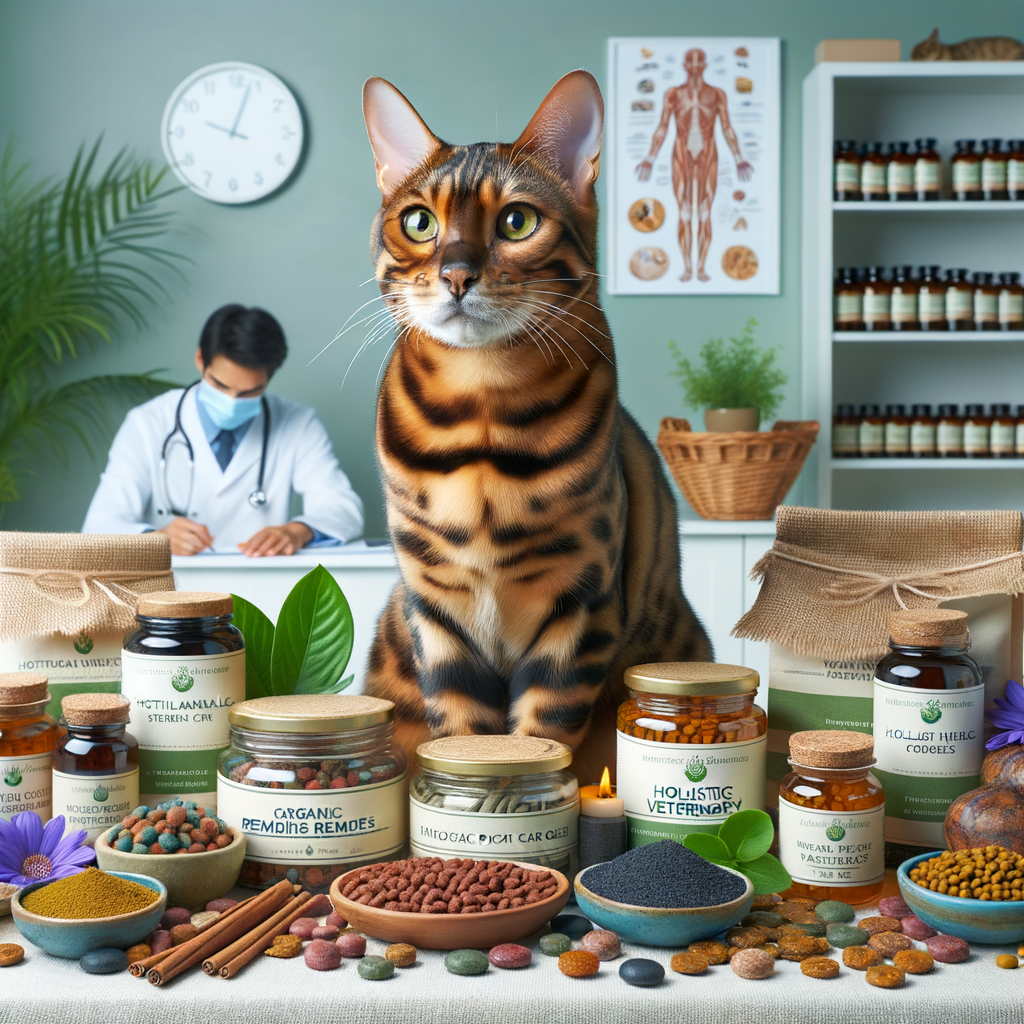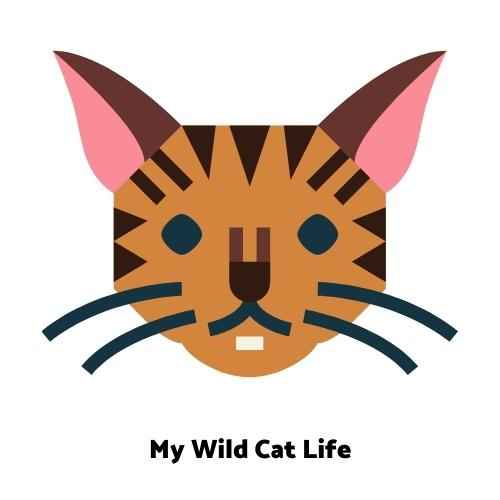
Introduction to Bengal Cat Health
When it comes to the health of your Bengal cat, knowledge is power. Understanding the unique characteristics of the breed and the common health issues they face can help you provide the best care for your furry friend. In this section, we will explore the Bengal cat breed and delve into some of the health issues they commonly face.
-
- Overview of Bengal Cat Breed
Bengal cats are a hybrid breed, a mix of a domestic cat and the Asian leopard cat. Known for their strikingly beautiful coat that resembles that of a wild leopard, Bengal cats are not just about looks. They are active, playful, and intelligent creatures. Their unique genetic makeup gives them a robust and healthy physique, but it also predisposes them to certain health issues.
-
- Common Bengal Cat Health Issues
While Bengal cats are generally healthy, they are prone to certain health conditions. Some of the most common health issues include:
-
-
- Progressive Retinal Atrophy (PRA): This is a genetic condition that can lead to blindness.
- Pyruvate Kinase Deficiency (PK Deficiency): This is a metabolic disorder that can cause anemia.
- Hypertrophic Cardiomyopathy (HCM): This is a heart condition that is common in many breeds of cats, including Bengals.
-
Regular vet check-ups can help detect these conditions early and manage them effectively. Remember, a healthy Bengal cat is a happy Bengal cat!
Understanding Holistic Pet Care
When it comes to the health and wellbeing of our beloved Bengal cats, holistic pet care offers a comprehensive approach that can significantly enhance their quality of life. But what exactly is holistic pet care, and how can it benefit your Bengal cat?
What is Holistic Pet Care?
Holistic pet care is a philosophy that considers the whole animal, not just specific parts or symptoms. It emphasizes the importance of a balanced diet, regular exercise, mental stimulation, and preventive care in maintaining optimal health.
- Definition of holistic pet care: Holistic pet care is a comprehensive approach to pet health that focuses on the whole animal. It includes physical, mental, and emotional wellbeing. It’s not just about treating illness, but also about preventing it through a balanced lifestyle.
- Benefits of holistic pet care for Bengal cats: Bengal cats are known for their energetic and playful nature. Holistic pet care can help maintain their vitality and prevent common health issues. It can improve their coat’s shine, enhance their energy levels, and even extend their lifespan. Moreover, it can also help in reducing stress and anxiety, which Bengal cats are often prone to.
Understanding and implementing holistic pet care can make a significant difference in your Bengal cat’s health and happiness. By focusing on the whole animal, you can ensure they live a long, healthy, and fulfilling life.
Principles of Holistic Veterinary Care for Bengal Cats
When it comes to holistic veterinary care for Bengal cats, there are four key principles to consider. These include preventive care, nutrition, exercise, and mental health. Let’s delve into each of these principles.
-
- Preventive Care
Preventive care is all about stopping health problems before they start. This means regular check-ups with a vet who understands the unique needs of Bengal cats. It also includes keeping up with vaccinations and parasite control. Regular grooming can also help prevent skin issues and matting.
-
- Nutrition
Nutrition is a vital part of holistic care. Bengal cats require a balanced diet to maintain their health and vitality. This means providing them with high-quality cat food that is rich in protein and low in carbohydrates. It’s also important to ensure they have access to fresh water at all times.
-
- Exercise
Exercise is another crucial aspect of holistic care. Bengal cats are active and playful, so they need plenty of physical activity to keep them healthy and happy. This can include playtime with toys, climbing on cat trees, or even leash training for outdoor adventures.
-
- Mental Health
Lastly, mental health is an often-overlooked aspect of holistic care. Bengal cats are intelligent and curious, so they need mental stimulation to prevent boredom and stress. This can be achieved through interactive toys, puzzle feeders, and even training sessions.
In conclusion, holistic veterinary care for Bengal cats involves a comprehensive approach that addresses not just physical health, but also mental well-being. By adhering to these principles, you can ensure your Bengal cat leads a healthy, happy, and fulfilling life.
Natural Remedies for Bengal Cats
As a Bengal cat owner, it’s important to be aware of the natural remedies that can help keep your feline friend healthy. These remedies can be a great alternative to traditional medicine, especially for minor ailments. Let’s explore some of the common health issues Bengal cats face and the natural remedies that can help.
Common Ailments and Natural Remedies
Bengal cats, like any other breed, can suffer from a variety of health issues. However, there are natural remedies that can help alleviate these problems. Here are a few:
-
- Herbal remedies for common Bengal cat health issues:
Herbs such as chamomile and catnip can be used to help soothe a Bengal cat’s digestive system and relieve anxiety. Echinacea can boost their immune system, while milk thistle can support liver health. Remember, it’s crucial to consult with a holistic vet before starting any herbal regimen.
-
- Homeopathic treatments for Bengal cats:
Homeopathy is a natural form of medicine that uses small doses of natural substances to help the body heal itself. For example, arnica can be used for trauma or injury, while belladonna can help with fever or inflammation. Again, it’s important to consult with a holistic vet before starting any homeopathic treatment.
By understanding the common ailments that can affect your Bengal cat and the natural remedies that can help, you can ensure your feline friend stays healthy and happy. Remember, while these remedies can be beneficial, they should never replace professional veterinary care. Always consult with a holistic vet before starting any new treatment regimen.
Case Study: Natural Remedies in Action
Let’s delve into a real-life example of a Bengal cat that has greatly benefited from the use of natural remedies. This case study will illustrate how holistic health practices can be a game-changer for your feline friend’s well-being.
- Case study of a Bengal cat benefiting from natural remedies
Meet Bella, a three-year-old Bengal cat. Bella’s owner noticed that she was often lethargic and had frequent digestive issues. After several visits to the vet and no significant improvement, Bella’s owner decided to try a more natural approach.
First, Bella’s diet was changed to include more natural, raw foods. This was to ensure that she was getting the right nutrients without any artificial additives. Bella’s owner also started incorporating herbal remedies into her routine. These included chamomile for its calming effects and ginger for its digestive benefits.
After a few weeks of these changes, Bella’s owner noticed a significant improvement. Bella was more energetic, her digestive issues had subsided, and overall, she seemed happier and healthier.
This case study is a testament to the power of natural remedies. It shows that with the right knowledge and resources, you can improve your Bengal cat’s health in a holistic and natural way.
| Before Natural Remedies | After Natural Remedies |
|---|---|
| Lethargic | Energetic |
| Frequent digestive issues | No digestive issues |
| Unhappy | Happier and healthier |
Remember, every cat is unique and what worked for Bella might not work for all. It’s always best to consult with a holistic pet care professional before making any major changes to your Bengal cat’s routine. But Bella’s story provides hope and inspiration for those looking to improve their pet’s health in a natural way.
Bengal Cat Diet and Nutrition
When it comes to the health of your Bengal cat, diet and nutrition play a crucial role. Just like humans, cats need a balanced diet to stay healthy and active. Let’s delve deeper into understanding Bengal cat nutrition.
Understanding Bengal Cat Nutrition
Understanding the nutritional needs of your Bengal cat is the first step towards ensuring their optimal health. Let’s explore the importance of a balanced diet and the specific nutritional needs of Bengal cats.
-
- Importance of a Balanced Diet
A balanced diet is vital for the overall health and well-being of your Bengal cat. It helps in maintaining a healthy weight, promotes a shiny and healthy coat, boosts the immune system, and supports the overall physical and mental well-being of your cat. A diet that lacks in any essential nutrients can lead to various health issues, including obesity, dental problems, and even serious conditions like heart disease.
-
- Specific Nutritional Needs of Bengal Cats
Bengal cats have specific nutritional needs that differ from other cat breeds. They require a high-protein diet, as they are an active breed with a fast metabolism. Protein helps in building strong muscles and provides the energy they need for their active lifestyle. They also need a good amount of taurine, an essential amino acid that supports heart health, vision, and reproduction. Apart from these, Bengal cats also require a balanced intake of fats, carbohydrates, vitamins, and minerals for their overall health.
In conclusion, understanding the nutritional needs of your Bengal cat and providing them with a balanced diet is key to their health and longevity. Remember, a healthy cat is a happy cat!
Creating a Holistic Diet Plan for Your Bengal Cat
When it comes to the health and well-being of your Bengal cat, a balanced and holistic diet plays a crucial role. Here, we will guide you on how to create a diet plan that caters to your Bengal cat’s unique nutritional needs.
-
- How to create a balanced, holistic diet plan for your Bengal cat
Creating a balanced, holistic diet for your Bengal cat involves understanding their specific nutritional needs and incorporating a variety of food sources to meet these needs. Bengal cats, like all felines, are obligate carnivores. This means they require a diet high in animal protein. However, a truly holistic diet goes beyond just meat.
Firstly, ensure your cat’s diet is rich in high-quality, lean proteins like chicken, turkey, or fish. Secondly, include small amounts of grains and vegetables, which provide essential vitamins and minerals. Remember, these should be cooked and mashed to aid digestion. Thirdly, include sources of taurine, an essential amino acid for cats, found in organ meats and seafood. Lastly, ensure your cat has access to fresh water at all times.
Remember, every cat is unique. Therefore, it’s essential to monitor your cat’s health and adjust their diet as needed. Regular vet check-ups can help you keep track of your cat’s health and make necessary dietary adjustments.
-
- Key takeaways for Bengal cat nutrition
Understanding Bengal cat nutrition is key to ensuring their health and longevity. Here are some key takeaways:
| Key Takeaway | Explanation |
|---|---|
| High Protein Diet | Bengal cats require a diet high in animal protein to support their muscle growth and energy levels. |
| Taurine | Taurine, an essential amino acid, is crucial for your cat’s heart and eye health. It’s found in organ meats and seafood. |
| Hydration | Always ensure your Bengal cat has access to fresh water. Hydration is essential for their kidney health and overall well-being. |
| Variety | A varied diet, including lean meats, grains, and vegetables, provides a range of nutrients and keeps mealtime interesting for your cat. |
In conclusion, creating a balanced, holistic diet for your Bengal cat involves understanding their unique nutritional needs and providing a variety of foods to meet these needs. Regular vet check-ups and monitoring your cat’s health will help you make necessary adjustments to their diet.
Holistic Health Tips for Bengal Cats
When it comes to maintaining the health of your Bengal cat, a holistic approach is key. This involves considering all aspects of your cat’s health, including their physical and mental well-being. Let’s delve into the importance of exercise and mental health for your Bengal cat.
Exercise and Mental Health
Exercise and mental health are two crucial components of your Bengal cat’s holistic health. They are interconnected, and neglecting one can adversely affect the other. Here’s why:
-
- Importance of Regular Exercise for Bengal Cats
Bengal cats are known for their high energy levels and athletic abilities. Regular exercise is essential to keep them healthy and happy. It helps to maintain their weight, strengthen their muscles, and improve their cardiovascular health. Moreover, exercise also aids in reducing behavioral problems such as aggression and destructiveness. A study showed that cats with regular exercise are less likely to develop obesity and related health issues.
-
- How to Ensure Your Bengal Cat’s Mental Health
Mental health is equally important for your Bengal cat. Mental stimulation can be achieved through interactive toys, puzzle feeders, and even training sessions. These activities not only keep your cat’s mind sharp but also strengthen your bond with them. It’s important to remember that a bored cat can become a destructive cat. Therefore, providing mental stimulation is crucial to prevent behavioral issues.
Remember, a healthy Bengal cat is a happy Bengal cat. By ensuring regular exercise and mental stimulation, you are contributing to their overall well-being. Embrace a holistic approach to your Bengal cat’s health and witness the positive changes it brings.
Preventive Care and Regular Check-ups
Preventive care and regular check-ups play a crucial role in maintaining the holistic health of Bengal cats. Let’s delve into why they are so important.
-
- Importance of preventive care for Bengal cats
Preventive care is the first line of defense in ensuring the health and well-being of your Bengal cat. It involves taking proactive steps to prevent diseases rather than treating them after they occur. This can include a balanced diet, regular exercise, and vaccinations.
Preventive care is particularly important for Bengal cats because they are prone to certain health issues like progressive retinal atrophy and hypertrophic cardiomyopathy. By taking preventive measures, you can significantly reduce the risk of these diseases and ensure your cat lives a long, healthy life.
-
- How regular check-ups contribute to holistic health for cats
Regular check-ups are another vital aspect of holistic health for Bengal cats. These check-ups allow veterinarians to detect any potential health issues early, which can make a significant difference in the treatment and prognosis of many diseases.
During a check-up, the vet will typically conduct a physical examination, take blood samples, and may also perform other tests depending on your cat’s age and health condition. These tests can help identify issues like kidney disease, diabetes, and thyroid problems, which are common in Bengal cats.
| Preventive Care | Regular Check-ups |
|---|---|
| Includes a balanced diet, regular exercise, and vaccinations | Includes physical examination, blood tests, and other health screenings |
| Helps prevent diseases like progressive retinal atrophy and hypertrophic cardiomyopathy | Helps detect diseases like kidney disease, diabetes, and thyroid problems early |
In conclusion, preventive care and regular check-ups are essential components of holistic health for Bengal cats. By prioritizing these, you can ensure your cat stays healthy and happy for many years to come.
Conclusion: Embracing Holistic Health for Your Bengal Cat
As we wrap up our comprehensive guide on holistic health for Bengal cats, it’s important to remember that your pet’s health is a journey, not a destination. Let’s summarize the key points we’ve discussed and share some final thoughts on embracing this approach.
-
- Summary of holistic health guide for Bengal cats
In this guide, we’ve explored the concept of holistic pet care, focusing on natural remedies, diet, and nutrition specifically for Bengal cats. We’ve learned that holistic health is about treating the whole cat, not just the symptoms of a disease. We’ve discovered that a balanced diet rich in proteins and low in grains is ideal for Bengal cats. We’ve also highlighted the importance of regular exercise and mental stimulation for your cat’s overall well-being.
-
- Final thoughts on embracing holistic pet care for Bengal cats
Embracing holistic pet care for your Bengal cat means committing to a lifestyle that prioritizes your cat’s overall health and happiness. It’s about understanding that every aspect of your cat’s life, from diet to environment, plays a vital role in their well-being. It may require a bit more effort and time, but the rewards – a healthier, happier cat and potentially fewer trips to the vet – are well worth it.
In conclusion, holistic health for your Bengal cat is not just a trend, but a comprehensive approach to pet care that can significantly enhance your cat’s quality of life. Remember, every cat is unique, so it’s important to tailor your approach to your pet’s specific needs. As always, consult with a trusted veterinarian before making any major changes to your cat’s health regimen.
| Key Takeaways |
|---|
| Holistic health treats the whole cat, not just the symptoms. |
| A balanced diet and regular exercise are crucial for Bengal cats. |
| Every aspect of your cat’s life impacts their overall health. |
| Always consult with a vet before making major health decisions for your cat. |














